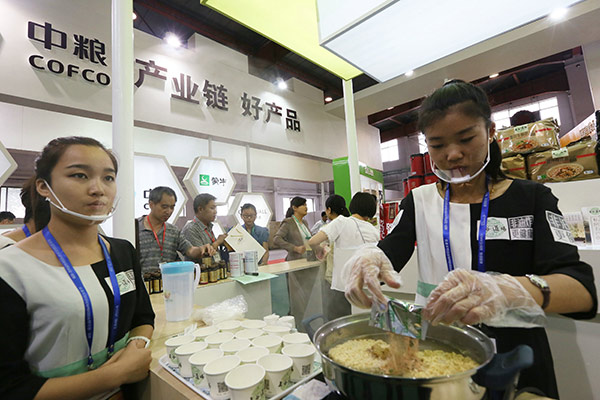Food giant sees top global role by 2020


State-owned China National Cereals, Oils and Foodstuffs Corp, also known as COFCO, has set a goal of becoming the largest food trader in the world by 2020 to rival global giants, according to its top executive.
"We aim to become the largest international food trader by 2020, not only in assets we own and revenues we make, but also in the quality of our assets, business operation, and return on investment," said Yu Xubo, president of COFCO.
"Currently, our assets are the largest among all food traders in the world, and we rank second in terms of revenue and business scale," he said.
The food behemoth's profits are expected to rise more than 60 percent year-on-year in 2017. It achieved 80 percent profit growth last year, according to Yu.
"We will hold a meeting on our mixed-ownership reform by the end of the month, and a plan on the reform will be released then," Yu said.
So far, COFCO has seen 14 of its units diversify their shareholding structures. And the company plans to carry out mixed-ownership reform in all of its 18 specialized arms by the end of 2018.
The Beijing-headquartered group now has operations and assets in more than 50 countries and regions in the world, and more than half of its revenue comes from international markets.
In stages, it has taken full control of Nidera BV, a Dutch grain trader, and Noble Agri Ltd, the soft commodities business of Noble Group, which gave it access to grain, oilseed and sugar in Brazil and Argentina, as well as in Europe and Australia. Noble Agri has now been renamed COFCO Agri.
"Through these acquisitions, we have become a strong rival to the 'ABCD' companies," said Yu.
The term "ABCD" refers to the companies that currently dominate global grain trading, namely, ADM Co, Bunge Ltd and Cargill Inc from the United States and the Netherlands-based Louis Dreyfus SAS.
"Chinese food producers should play a more active role in the international food and oil industry. We should also be more involved in formulating international rules and standards in the sector," Yu said.
He said COFCO is keen to play a bigger role in the supply-side reform of the country's agricultural sector.
The company will focus on creating a series of famous brands and expand the scale of imported products to meet Chinese consumers' demand for high-quality and customized food.
Chen Wenling, chief economist at China Center for International Economic Exchanges, said although China has made great achievements in the supply-side reform, the country still lacks high-quality products and internationally-recognized standards.
"About 90 percent of international standards are created by the United States, Japan and Europe, while China now accounts for less than 1 percent of those standards," said Chen.




































